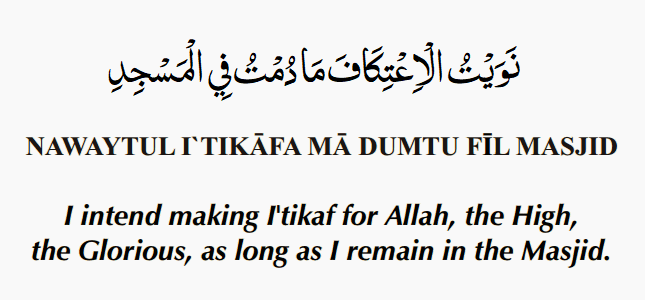- WAJIB:
To vow or pledge to make I’tikaf (on a fixed day) for the sake of Allah ﷻ upon the fulfilment of some wish or desire, the least duration of a wajib I’tikaf is one day and night and it must be accompanied by a fast. - SUNNAT-MUAKKADAH:
To reside the last ten nights and days of Ramadhan in the Masjid is Sunnat-Muakkadah ‘alal Kifayah, i.e. If a person from the community fulfils the obligation of I’tikaf, the entire community will be absolved of this sacred duty. Otherwise all the residents will be sinful of neglecting this Sunnah of our Nabi ﷺ. - MUSTAHAB OR NAFL:
This I’tikaf can be for any amount of time, even for a few minutes.
Itikaf - Rules of itikaf
What is itikaf in Islam - What are the benefits of itikaf - What to Do During Itikaf - itikaf for females - itikaf for males - how to perform itikaf
Itikaf - How to Perform itikaf For Females and Males
In Islam, Itikaf is a highly significant spiritual practice that involves seclusion and retreat in a mosque or other designated place of worship during the last ten days of the holy month of Ramadan or at any other time of the year. It is considered a highly rewarding act of worship and a means of seeking nearness to Allah. The word “Itikaf” comes from the Arabic word “Akafa,” which means to stay or remain in a place for a certain period of time. During Itikaf, a Muslim devotes himself or herself entirely to worship, seeking Allah’s blessings and forgiveness, and engaging in acts of remembrance and supplication. The significance of Itikaf in Islam can be understood in several ways.
First, it is a time for spiritual renewal and self-reflection, allowing the individual to deepen his or her relationship with Allah and to purify the heart and mind. It is also an opportunity for the Muslim to disconnect from worldly distractions and focus solely on the worship of Allah.
Second, Itikaf is a time of intense spiritual reward. It is said that the reward for Itikaf is equivalent to that of performing Hajj and Umrah, and that even a moment spent in Itikaf can bring immense blessings and forgiveness from Allah.
Third, Itikaf is a time of community and brotherhood. Muslims who participate in Itikaf often form close bonds with each other, united in their devotion to Allah and their pursuit of spiritual growth.
Overall, Itikaf is a highly significant practice in Islam, offering a unique opportunity for spiritual growth, reward, and community.
The basic purpose of I’tikaf is that the heart gets attached to Allah ﷻ and, with it, one attains inner composure and equanimity, and preoccupation with the mundane things of life ceases, and absorption in the eternal reality takes its place. And the state is reached in which all fears, hopes and apprehensions are superseded by the love and remembrance of Allah ﷻ.
Rasulullah ﷺ always observed I’tikaf and the Muslims have on a whole adhered to it. It has become a regular feature of the month of Ramadhan and a confirmed practice with the devout and the faithful. Ayesha رضی اللہ تعالیٰ عنہ relates that “Rasulullah ﷺ regularly observed I’tikaf during the last ten days of Ramadhan till the end of his life. After him, his wives maintained the tradition”.

NIYYAH FOR NAFL ITIKAF

Conditions Of Itikaf:
There are certain conditions that need to be met for Itikaf to be valid and acceptable in Islam. These conditions are:
Intention: The intention of the person performing Itikaf must be solely for the sake of seeking the pleasure of Allah and to engage in acts of worship.
Time: Itikaf must be performed for a minimum of one day and one night. It is typically performed during the last ten days of Ramadan, but it can be performed at any time of the year.
Place: Itikaf must be performed in a mosque or other designated place of worship.
Seclusion: The person performing Itikaf must remain in seclusion within the designated area and must not leave except for a valid reason, such as using the restroom or taking a shower.
Fasting: It is highly recommended to fast during the days of Itikaf.
Ritual purity: The person performing Itikaf must maintain ritual purity by performing ablution (wudu) and observing proper hygiene.
Avoidance of sins: The person performing Itikaf must avoid any sinful or inappropriate behavior, such as lying, backbiting, or engaging in frivolous activities.
Permission: If the person performing Itikaf is married, they must have the permission of their spouse.
Meeting these conditions is important for Itikaf to be valid and acceptable in the eyes of Allah. It is a time of spiritual devotion and purification, and it requires dedication, commitment, and discipline to fully benefit from this spiritual practice.
THINGS PERMITTED DURING ITIKAF:
- Eating.
- Sleeping.
- Discussing matters of Deen or necessary talk.
Things To Do During Itikaf:
During Itikaf, the person performing it is encouraged to engage in various acts of worship, remembrance, and contemplation. Here are some recommended activities to do during Itikaf:
Recitation of the Quran: It is highly recommended to recite the Quran during Itikaf, as it is a time of intense spiritual reward.
Dhikr: Engage in remembrance of Allah through the recitation of various dua (supplications), tasbih (subhanallah, alhamdulillah, allahu akbar), and other forms of dhikr.
Nafl prayers: Perform optional (nafl) prayers, such as Tahajjud, Ishraq, and Duha prayers.
Seeking forgiveness: Seek Allah’s forgiveness through repentance and reflection on one’s actions and intentions.
Learning: Attend Islamic lectures or classes to increase one’s knowledge and understanding of Islam.
Charity: Give charity to those in need, as it is a time of great reward for giving in the way of Allah.
Reflection: Reflect on one’s life and relationship with Allah, and make a plan for how to continue to improve after Itikaf.
Avoidance of idle talk and other distractions: It is important to avoid idle talk and other distractions during Itikaf, in order to maintain focus on spiritual purification and worship.
Increase in good deeds: Use the time of Itikaf to increase in good deeds and to strive to be a better Muslim, neighbor, and community member.
These are just a few of the recommended activities to do during Itikaf. The main focus should be on spiritual purification, seeking Allah’s forgiveness and blessings, and increasing one’s devotion to Allah.
ITIKAF FOR WOMEN
Ladies may also perform I’tikaf by designating a portion of their house; wherein they normally pray salaah. This is not a Shar’i Masjid, none of the rulings applicable to Masjid’s apply. The purpose behind this designation is merely for I’tikaf purposes for the ladies. Any lady is at liberty to perform I’tikaf for the last ten days of Ramadhan in this specific room and thereby acquire the same reward as the menfolk in the Masjid.
Ladies should remember, that for them to perform this I’tikaf of the last ten days of Ramadhan; purity (from Haydh) is essential. It should also be noted that for I’tikaf of the last ten days of Ramadhan, ladies will not be able to undertake household duties. These domestic chores will be performed by daughters under her supervision while in I’tikaf.
Rewards Of Itikaf:
Itikaf is considered a highly rewarding act of worship in Islam. The reward of Itikaf is both spiritual and material. Here are some of the rewards that a person can attain by performing Itikaf:
Nearness to Allah: Itikaf is a time of intense spiritual devotion and seclusion, which can lead to a greater sense of nearness to Allah.
Forgiveness of sins: Itikaf is a time of seeking forgiveness and repentance, and it is believed that Allah forgives the sins of those who sincerely seek forgiveness during this time.
Increase in spirituality: Itikaf is a time of spiritual purification and reflection, which can lead to an increase in spirituality and a stronger connection with Allah.
Great reward: It is said that the reward for Itikaf is equivalent to that of performing Hajj and Umrah.
Increase in good deeds: The time spent in Itikaf is an opportunity to increase in good deeds and to do acts of worship that one may not be able to do during other times of the year.
Protection from evil: It is believed that performing Itikaf can protect a person from evil and temptation.
Fulfillment of wishes: Itikaf is a time of intense supplication and prayer, and it is believed that Allah may grant the wishes of those who sincerely pray and supplicate during this time.
Overall, Itikaf is a time of great reward and blessing in Islam. It is an opportunity to seek nearness to Allah, purify the soul, and increase spirituality and good deeds.
